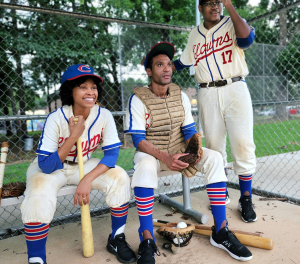Il barbiere di Siviglia (The Barber of Seville) has remained solidly and consistently in the operatic repertory for 200 years. It has charmed and tickled the funny bone of thousands and has introduced many neophytes to the art form. Its famous rambunctious overture was actually borrowed from an earlier Rossini opera. It has none of the themes from the opera but it is an orchestral concert favorite in its own right. Figaro’s entrance aria “Largo al factotum” is one of the most popular operatic arias and has been often parodied.
What we have here is a 200-year-old hit reprised by the North Carolina Opera for the great pleasure of Triangle audiences. (Performance repeats on Sunday at 3:00 at Raleigh’s Memorial Auditorium.) The orchestra under the direction of Timothy Myers delivered a sparkling performance of the overture. Crisp, clear attacks and articulation, sweet lyrical contrasting passages, Rossini’s long crescendos; all were masterfully rendered and received appreciative applause from a nearly full house.
The curtain rises on the town houses of Seville. The sets and production were imported from Glimmerglass Opera; the exterior facades and the interior rooms were moveable on wheels so that the scene could change from exterior to interior virtually in the blink of an eye. In a number of scenes, the sets were also employed in a comedic effect.
Lindoro (actually Count Almaviva), with the assistance of a town band is serenading the lovely young Rosina with whom he is madly in love. The band, singing here in chorus and elsewhere in the opera, rendered some fetching male vocal passages. The excellent chorus master for this production is Scott MacLeod. Count Almaviva was sung by the acclaimed American tenor, Andrew Owens who currently resides in Berlin and has sung several roles with the Theater an der Wien. His Italianate lyricism was ideal for the role.
Failing to get any response from Rosina, Almaviva gives up serenading her and dismisses the band. How can he get her attention? Who can help him? Enter Figaro on his bicycle.
American baritone Troy Cook recently performed his first Ford in the Hamburgische Staatsoper’s Falstaff following his debut with the company as Marcello in La bohème. Add to that a sterling performance as Figaro. His “Largo Factotum” was outstanding, filled with charming bravisimo and bright joie de vivre. Whenever he appeared on stage the scene got a little brighter and warmer.
In the next scene, we learn that Rosina did in fact hear Almaviva’s serenade. In a cavatina “Una voce poco fa” (a voice a little while ago), she sings of her attraction to the singer and writes him a note. Hailed by the New York Times as a “rich-voiced mezzo-soprano,” our Rosina, Cecelia Hall, is one of an exciting new crop of versatile American singers, poised on the threshold of an international career. Her performance was convincing in every respect.
Dr. Bartolo, Rosina’s guardian, was sung by Bass-baritone Tyler Simpson who has been described as a compelling artist with an easy command of sensitive musicianship and committed dramatic portrayals. His Bartolo was richly timbered and dramatically persuasive.
American bass, Adam Lau, has been praised as a “bass of real quality, with sonorous low notes.” His portrayal of the music teacher, Don Basilio, was solid musically and reflected a real understanding of comedic interaction. Dr, Bartolo’s housekeeper, Berta was winsomely portrayed by Marie Ashley. Her sneeze was hilarious and her aria was done with seasoned skill.
Fiorello was sung by Charles Hyland. Wade Henderson was An Officer and Joseph Stephens sang Ambrogio. The duets and small ensembles were marvelous. The riotous ending of the first act was especially outstanding and invigorating.
Harpsichordist Laurie Rogers, accompanying the recitatives, deserves recognition for an outstanding job. The costumes were designed by Howard Tsvi Kaplan for the Sarasota Opera, and the costume coordinator for the NCO production was Denise Schumaker. All the technical artists, assistants and behind the scenes workers, professionals and volunteers deserve kudos. And a special round of applause for NCO stage director, Stephanie Havey and general director, Eric Mitchko.
Though the scenery and the costumes seemed a bit shopworn, they worked well. As an over-all production, The Barber of Seville was among the best done by NCO vocally and musically and was surely on level with the best regional opera. The Barber of Seville repeats on Sunday at 3:00 pm in Raleigh’s Memorial Auditorium.











